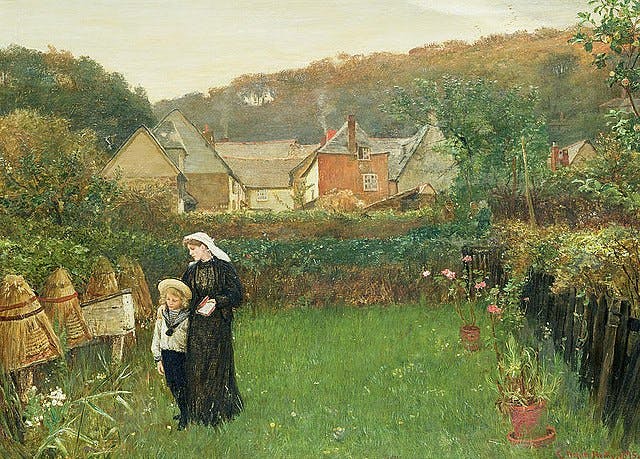Poem of the Day: ‘Telling the Bees’
Nobody seems to know the precise provenance of this tradition, not even scholars of the folklore associated with beekeeping.

One of the most arcane rituals surrounding the September death of Queen Elizabeth II, and one of the most affecting in its homeliness, was the royal beekeeper’s visit to the royal bees, to tell them of their mistress’s passing. “Telling the bees,” as this New York Times article informs us, “is a standard practice that goes back centuries, with potentially grave consequences if not followed . . . bees, as members of the family, should be informed of major life events in the family, especially births and deaths.”
According to tradition, the beekeeper must knock on the hive and make a formal announcement. Failure to tell the bees might result in their refusal to make honey, or even in the collapse of their colony. Nobody seems to know the precise provenance of this tradition, not even scholars of the folklore associated with beekeeping. It is described variously as ancient, or else simply old. If it goes back centuries, nobody seems prepared to say how many centuries. How actually widespread it ever was seems equally uncertain. At any rate, at the passing of Elizabeth, what’s old became news to most of us.
Although the practice of telling the bees apparently flourished, to some extent, anyway, as recently as the nineteenth century, the American poet Lizette Woodworth Reese (1856–1935) felt it necessary to add an explanatory note to today’s Poem of the Day. That is, she seems not to have felt that she needed to explain the title or the poem’s dimeter refrain, which ends each rhymed tetrameter stanza, but only to locate the tradition in an era.
This note, perhaps, is what gives the poem’s setting its period feel, though the servant’s biblical name and the suggestion of an enclosed garden contribute to an atmosphere of time past. Yet as in any poem, the scene also suggests a concentrated now. It represents a memory re-entered fully, the continual re-experience of an event which has always just happened. No matter where she is in time, the child speaker has always just run into the garden, to hear news of her mother’s death told first to the bees, not to her, a grief that is ever old but always news.
Telling the Bees
by Lizette Woodworth Reese
A Colonial Custom
Bathsheba came out to the sun,
Out to our wallèd cherry-trees;
The tears adown her cheek did run,
Bathsheba standing in the sun,
Telling the bees.
My mother had that moment died;
Unknowing, sped I to the trees,
And plucked Bathsheba’s hand aside;
Then caught the name that there she cried
Telling the bees.
Her look I never can forget,
I that held sobbing to her knees;
The cherry-boughs above us met;
I think I see Bathsheba yet
Telling the bees.
___________________________________________
With “Poem of the Day,” The New York Sun offers a daily portion of verse selected by Joseph Bottum with the help of the North Carolina poet Sally Thomas, the Sun’s associate poetry editor. Tied to the day, or the season, or just individual taste, the poems will be typically drawn from the lesser-known portion of the history of English verse. In the coming months we will be reaching out to contemporary poets for examples of current, primarily formalist work, to show that poetry can still serve as a delight to the ear, an instruction to the mind, and a tonic for the soul.
